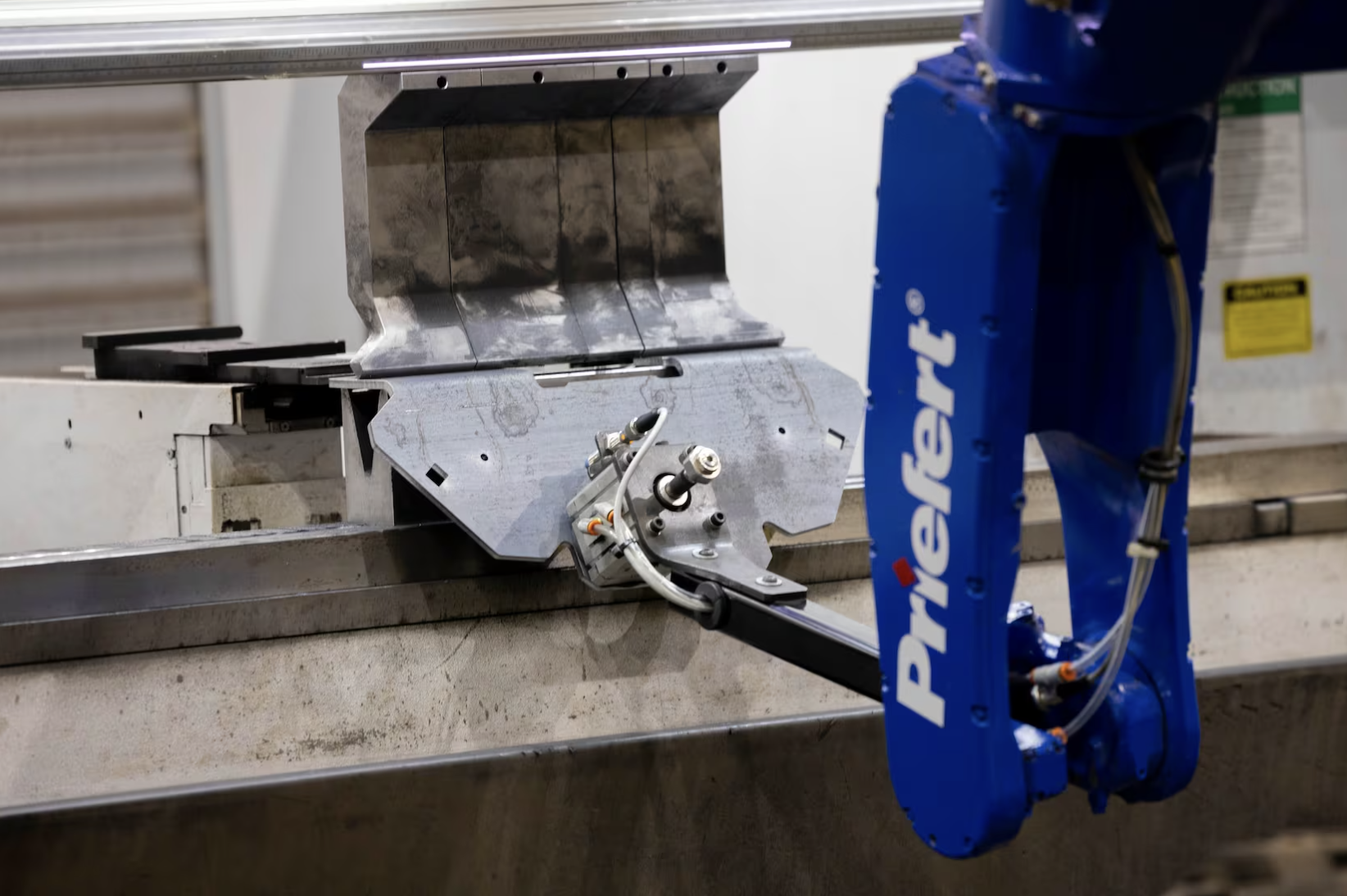An East Texas firm prepares to go all in on solar manufacturing
The Mount Pleasant-based company said it expects to ramp up production and add hundreds of employees to its factory in East Texas.
By Irving Mejia-Hilario, The Dallas Morning News
An East Texas company that primarily builds products for farming, ranches and rodeos is crediting the Inflation Reduction Act with enabling it to expand deeper into green energy manufacturing at its 300-acre campus.
The act — a $737 billion congressional program aimed at stoking investment in an energy transition with new tax credits — makes it more lucrative for Priefert Manufacturing to produce solar mounting and tracking equipment in Mount Pleasant for Oakland, Calif.-based Nevados Engineering.
Priefert has been working with Nevados since 2021 by building torque tubes for a solar site for the company. But by expanding that relationship, Priefert will add to its 900-employee workforce within the next two years, said Rocky Christenberry, executive vice president of Priefert Steel.
About 40 to 50 of the company’s workers are now involved in building Nevados products, but Christenberry said he expects that to grow.
“We’re installing another thing right now that will require three crews — think about the material handling and all the shipping involved in it,” he said. “It’s a lot of material handling that has to happen, so the jobs will ramp up pretty quickly.”
Christenberry said the act’s bonus tax credits make it a no-brainer to invest deeper into solar manufacturing. Those incentives are intended to ensure components of clean energy technologies are manufactured in the U.S.
A welder works on a gate at Priefert Manufacturing in Mount Pleasant on Thursday, Nov. 16, 2023. Mount Pleasant-based Priefert Steel will manufacture San Francisco-based Nevados’ solar mounting and tracking equipment at its 300-acre campus in East Texas.(Juan Figueroa / Staff Photographer)
“It’s no secret that our economy has been on the verge of a recession, and having different divisions inside our company is important for stability,” he said. “Turns out that energy and infrastructure and everything related is booming right now. So it made sense for us to embrace Nevados when this opportunity came up.”
The combination of the act and Texas’ bright future for solar power accelerated the need for Nevados to work with Priefert, said Jenya Meydbray, Nevados’ chief commercial officer.
“The carbon footprint of the transportation from Texas to anywhere in the U.S. is as low as can be,” he said. “As fuel plants retire and the electrical load on the grid grows, it’s clear that we need more solar, doesn’t matter what the technology is.”
Priefert will build Nevados’ tracking system and solar panels, which can be placed on hilly terrain, eliminating the need to flatten the land with bulldozers and dump trucks, Christenberry said. The trackers are also capable of tilting solar panels so they can keep up with the sun’s movement.
Nevados will sell its product to solar developers and construction companies including Ampliform, Cupertino Electric, BlueWave, Cogent Renewables, CF Energy, D. E. Shaw Renewable Investments, Primoris Renewable Energy and others, Meydbray said.
Though Nevados operates in the U.S., Meydbray said he could see the company expanding internationally within three years as the demand for solar power increases.
“Everybody is facing the same challenges and trying to fix the same problem,” he said. “So the opportunity globally is huge. It’s big here in the U.S., but because of the electrification of the grid and climate change, we think it’s even more massive globally.”
Christenberry said he sees the expanded work’s impact stretching far beyond Mount Pleasant, which is roughly two hours northeast of Dallas.
Rocky Christenberry, executive vice president of Priefert Steel, talks about the cradle used on a Nevados solar panel.
“It’s never-ending with what’s being touched by this out here,” Christenberry said. “It’ll leave here, go to a job site where literally hundreds of people will put it to use and be hooked to the electrical grid, which is feeding our homes and businesses. It’s touching everyone’s lives in the end.”
Even the waste byproduct could result in additional profit for both companies, Christenberry said.
“Our waste stream is something we’re always looking at. If it’s in the dumpster, it’s throwing away money for everyone, which I have to charge Nevados for,” he said. “But we think we can find a use for it somewhere else, whether it’s ranch equipment or the trailer industry or something else.”
Priefert has a team focused on finding ways to reuse its waste, including a “waste czar.” Christenberry said the company is in discussions with scrap companies on ways to reuse the waste.
Despite Texas being a leader in solar energy, it’s also often a target of critics who consider it a less reliable source than fossil fuel-powered plants.
Christenberry said Priefert will move full speed ahead. “This industry provides power in peak time in the afternoon. It makes sense to do this.”
To Priefert and East Texas, it’s an important deal that shows how federal programs can trickle down to small communities, Christenberry said.
The act allocated billions of dollars in tax credits to encourage home installation of energy efficiency technology, purchases of electric vehicles and investments in renewable generation.
“Every day, the world is changing. Solar may have been around for a long time, but it’s new to a lot of people,” Christenberry said. “I don’t know why anyone would object to this. We need to find a way to coexist with modern energy requirements that are needed. I just hope this will help, for what it’s worth.”

